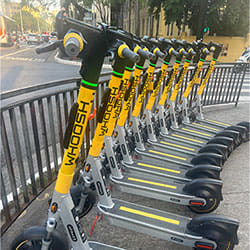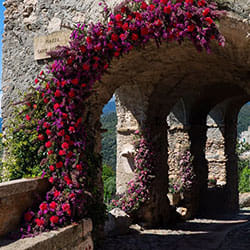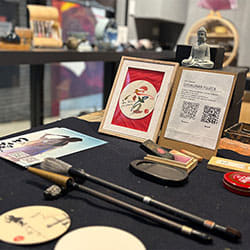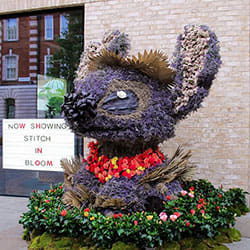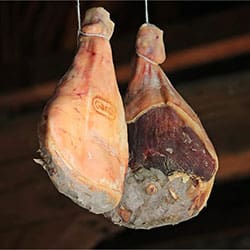Lately, several American television programs on getting the perfect weddinggown for your wedding have been airing on Dutch television.
Just like many of my friends, I like to indulge in these series with a cup of tea and watch American brides-to-be buy dresses sometimes estimated at over $10,000 (roughly ¥1,124,000). Although these shows don’t pay much attention to the meaning of married life, it has spiked my interest in thinking about what marriage is and why it is important.
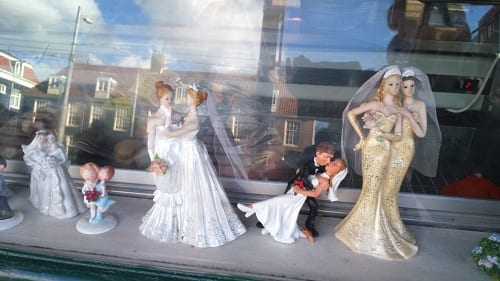
In Amsterdam I know many people who feel marriage is not necessary. To many people this could mean many things, but some say they don’t need a piece of paper to prove their love for each other, others associate it with being an old (Christian) tradition which does not fit the modern times we live in. These feelings are also rooted in the fact that in The Netherlands, it is not strange to have kids without getting married first. Although I am sure that there are still many communities where it is being frowned upon, there are also many families where the parents just live together. Some of these couples might decide to get married later on, some might never take that step. These kind of arrangements are also supported by Dutch law, as there are three official forms in which Dutch couples can register their unity; huwelijk (‘marriage’), geregistreerd partnerschap (‘registered partnership’) and samenlevingscontract (‘living-together contract’). I will explain what these mean below.Marriage is applied for and conducted at the local city hall. In this ceremony both parties have to agree to the marriage by saying “I do” and at least two witnesses have to be present. After this form of registration it is allowed to also have a religious ceremony at a church or mosque. Being married means that both partners are obliged to support each other and that if one partner passes away, the remaining partner inherits his or her belongings. Registered partnership is almost the same as a marriage, but it is not necessary to seal the marriage with ‘I do’s’ and it is annulled more easily. If there are no children involved, it is possible to dissolve the registered partnership by making a mutual agreeable arrangement with the help of an attorney or solicitor which then needs to be signed by both parties. To divorce after marriage, you have to go through court. A registered partnership can be changed to a marriage. A marriage can not be changed to a registered partnership. So what purpose does a registered partnership have if it is so similar to marriage? It seems that a lot of same sex couples choose this form of registration. Another reason (or overlapping reason) could be that people don’t want to associate their union with any form of religion. It could also be for practical reasons. Two friends of mine chose to have a registered partnership because they were buying a house together and it made the paperwork a lot easier. Although they do plan to get married in the future, for now this type of registration was good enough for them. The third kind or registration, the living-together contract, is a different kind of union. In this contract the couple lists rules for themselves to abide by when living together. These could regard the dividing of living costs (rent, groceries, etc.), the costs of childrearing, the dividing of belonging if breaking up, etc. This contract is proof of your being together as a couple and could be useful in several situations. For instance, when one partner has to move abroad for work for a few years, this contract can support the remaining partner’s application for a VISA. Although these three forms of couple’s registration can be quite confusing, I do believe it gives people more freedom to pursue the kind of lifestyle they want to live. As I lightly touched upon above, same sex marriage is also legal in The Netherlands. In fact, the law which allows same sex marriage, which took effect on April 1st 2001, was the first worldwide. As a young Dutch women, ideally, I would rather not see same sex marriage be viewed as “special” or “progressive”, but just as ordinary as any marriage. However, I am happy that is is accepted in The Netherlands, as it is not in many other countries. So what is a Dutch marriage like, and what are typical Dutch traditions? As I discussed in my last article, the gender roles in Dutch society may vary a lot from what men and women expect from each other in Japan. A lot of women work even when they have children and many men also partake in cooking, cleaning and childrearing. So in this sense, it is difficult to describe what Dutch marriage entails, apart from being a registered union between two people. I don’t think a lot changes in people’s daily lives when they change from “dating” to “married”. It is also difficult to it is difficult to write down an ultimate list of customs, because The Netherlands is a multicultural society, but here a at least a few generally accepted components: Firstly, the wedding dress of the bride is traditionally white to symbolise the bride’s virginity and pureness. In some areas it used to be custom to use the fabric of the dress to line and decorate the crib of the first born child. The veil of the bride symbolises her subordinate role to the man as he is the one to remove it. Recently however, there are also brides who remove the veil themselves or don’t have a veil at all. Then there is the bridal cake. It is a symbol of good fortune. The bigger the cake, the more good luck is bestowed on the couple. When the couple leave city hall or the church, there is a custom to shower them with uncooked rice. Naturally, this tradition originates in the Far East. It symbolises good fortune and that there is no lack of anything. During the ceremony the bride is “given away” by the father after walking his daughter down the aisle. This expresses the good faith the father, as head of the family, has in this new union. In older times however, it seems that marriage was a business-like arrangement and the father received a payment for his daughter for literally giving her away. Finally, there is the tradition of carrying the woman over the threshold when returning back home for the first time as a married couple. This is because it is believed to be bad luck for the bride to trip on the threshold, and also because it was thought that the demons from the bride’s home would follow her into the new. By carrying her over the threshold, the demons might be brought off of their path. So, for all reasons explained above, the experience of marriage (or necessity) in The Netherlands might differ a lot with Japanese customs on some points. However, I do believe that every bride and groom, or bride and bride, or groom and groom, Dutch or Japanese, who wish to marry, do so because they love each other and want to spend the rest of their lives together. It is a wonderful thing.
 In Amsterdam I know many people who feel marriage is not necessary. To many people this could mean many things, but some say they don’t need a piece of paper to prove their love for each other, others associate it with being an old (Christian) tradition which does not fit the modern times we live in. These feelings are also rooted in the fact that in The Netherlands, it is not strange to have kids without getting married first. Although I am sure that there are still many communities where it is being frowned upon, there are also many families where the parents just live together. Some of these couples might decide to get married later on, some might never take that step. These kind of arrangements are also supported by Dutch law, as there are three official forms in which Dutch couples can register their unity; huwelijk (‘marriage’), geregistreerd partnerschap (‘registered partnership’) and samenlevingscontract (‘living-together contract’). I will explain what these mean below.Marriage is applied for and conducted at the local city hall. In this ceremony both parties have to agree to the marriage by saying “I do” and at least two witnesses have to be present. After this form of registration it is allowed to also have a religious ceremony at a church or mosque. Being married means that both partners are obliged to support each other and that if one partner passes away, the remaining partner inherits his or her belongings. Registered partnership is almost the same as a marriage, but it is not necessary to seal the marriage with ‘I do’s’ and it is annulled more easily. If there are no children involved, it is possible to dissolve the registered partnership by making a mutual agreeable arrangement with the help of an attorney or solicitor which then needs to be signed by both parties. To divorce after marriage, you have to go through court. A registered partnership can be changed to a marriage. A marriage can not be changed to a registered partnership. So what purpose does a registered partnership have if it is so similar to marriage? It seems that a lot of same sex couples choose this form of registration. Another reason (or overlapping reason) could be that people don’t want to associate their union with any form of religion. It could also be for practical reasons. Two friends of mine chose to have a registered partnership because they were buying a house together and it made the paperwork a lot easier. Although they do plan to get married in the future, for now this type of registration was good enough for them. The third kind or registration, the living-together contract, is a different kind of union. In this contract the couple lists rules for themselves to abide by when living together. These could regard the dividing of living costs (rent, groceries, etc.), the costs of childrearing, the dividing of belonging if breaking up, etc. This contract is proof of your being together as a couple and could be useful in several situations. For instance, when one partner has to move abroad for work for a few years, this contract can support the remaining partner’s application for a VISA. Although these three forms of couple’s registration can be quite confusing, I do believe it gives people more freedom to pursue the kind of lifestyle they want to live. As I lightly touched upon above, same sex marriage is also legal in The Netherlands. In fact, the law which allows same sex marriage, which took effect on April 1st 2001, was the first worldwide. As a young Dutch women, ideally, I would rather not see same sex marriage be viewed as “special” or “progressive”, but just as ordinary as any marriage. However, I am happy that is is accepted in The Netherlands, as it is not in many other countries. So what is a Dutch marriage like, and what are typical Dutch traditions? As I discussed in my last article, the gender roles in Dutch society may vary a lot from what men and women expect from each other in Japan. A lot of women work even when they have children and many men also partake in cooking, cleaning and childrearing. So in this sense, it is difficult to describe what Dutch marriage entails, apart from being a registered union between two people. I don’t think a lot changes in people’s daily lives when they change from “dating” to “married”. It is also difficult to it is difficult to write down an ultimate list of customs, because The Netherlands is a multicultural society, but here a at least a few generally accepted components: Firstly, the wedding dress of the bride is traditionally white to symbolise the bride’s virginity and pureness. In some areas it used to be custom to use the fabric of the dress to line and decorate the crib of the first born child. The veil of the bride symbolises her subordinate role to the man as he is the one to remove it. Recently however, there are also brides who remove the veil themselves or don’t have a veil at all. Then there is the bridal cake. It is a symbol of good fortune. The bigger the cake, the more good luck is bestowed on the couple. When the couple leave city hall or the church, there is a custom to shower them with uncooked rice. Naturally, this tradition originates in the Far East. It symbolises good fortune and that there is no lack of anything. During the ceremony the bride is “given away” by the father after walking his daughter down the aisle. This expresses the good faith the father, as head of the family, has in this new union. In older times however, it seems that marriage was a business-like arrangement and the father received a payment for his daughter for literally giving her away. Finally, there is the tradition of carrying the woman over the threshold when returning back home for the first time as a married couple. This is because it is believed to be bad luck for the bride to trip on the threshold, and also because it was thought that the demons from the bride’s home would follow her into the new. By carrying her over the threshold, the demons might be brought off of their path. So, for all reasons explained above, the experience of marriage (or necessity) in The Netherlands might differ a lot with Japanese customs on some points. However, I do believe that every bride and groom, or bride and bride, or groom and groom, Dutch or Japanese, who wish to marry, do so because they love each other and want to spend the rest of their lives together. It is a wonderful thing.
In Amsterdam I know many people who feel marriage is not necessary. To many people this could mean many things, but some say they don’t need a piece of paper to prove their love for each other, others associate it with being an old (Christian) tradition which does not fit the modern times we live in. These feelings are also rooted in the fact that in The Netherlands, it is not strange to have kids without getting married first. Although I am sure that there are still many communities where it is being frowned upon, there are also many families where the parents just live together. Some of these couples might decide to get married later on, some might never take that step. These kind of arrangements are also supported by Dutch law, as there are three official forms in which Dutch couples can register their unity; huwelijk (‘marriage’), geregistreerd partnerschap (‘registered partnership’) and samenlevingscontract (‘living-together contract’). I will explain what these mean below.Marriage is applied for and conducted at the local city hall. In this ceremony both parties have to agree to the marriage by saying “I do” and at least two witnesses have to be present. After this form of registration it is allowed to also have a religious ceremony at a church or mosque. Being married means that both partners are obliged to support each other and that if one partner passes away, the remaining partner inherits his or her belongings. Registered partnership is almost the same as a marriage, but it is not necessary to seal the marriage with ‘I do’s’ and it is annulled more easily. If there are no children involved, it is possible to dissolve the registered partnership by making a mutual agreeable arrangement with the help of an attorney or solicitor which then needs to be signed by both parties. To divorce after marriage, you have to go through court. A registered partnership can be changed to a marriage. A marriage can not be changed to a registered partnership. So what purpose does a registered partnership have if it is so similar to marriage? It seems that a lot of same sex couples choose this form of registration. Another reason (or overlapping reason) could be that people don’t want to associate their union with any form of religion. It could also be for practical reasons. Two friends of mine chose to have a registered partnership because they were buying a house together and it made the paperwork a lot easier. Although they do plan to get married in the future, for now this type of registration was good enough for them. The third kind or registration, the living-together contract, is a different kind of union. In this contract the couple lists rules for themselves to abide by when living together. These could regard the dividing of living costs (rent, groceries, etc.), the costs of childrearing, the dividing of belonging if breaking up, etc. This contract is proof of your being together as a couple and could be useful in several situations. For instance, when one partner has to move abroad for work for a few years, this contract can support the remaining partner’s application for a VISA. Although these three forms of couple’s registration can be quite confusing, I do believe it gives people more freedom to pursue the kind of lifestyle they want to live. As I lightly touched upon above, same sex marriage is also legal in The Netherlands. In fact, the law which allows same sex marriage, which took effect on April 1st 2001, was the first worldwide. As a young Dutch women, ideally, I would rather not see same sex marriage be viewed as “special” or “progressive”, but just as ordinary as any marriage. However, I am happy that is is accepted in The Netherlands, as it is not in many other countries. So what is a Dutch marriage like, and what are typical Dutch traditions? As I discussed in my last article, the gender roles in Dutch society may vary a lot from what men and women expect from each other in Japan. A lot of women work even when they have children and many men also partake in cooking, cleaning and childrearing. So in this sense, it is difficult to describe what Dutch marriage entails, apart from being a registered union between two people. I don’t think a lot changes in people’s daily lives when they change from “dating” to “married”. It is also difficult to it is difficult to write down an ultimate list of customs, because The Netherlands is a multicultural society, but here a at least a few generally accepted components: Firstly, the wedding dress of the bride is traditionally white to symbolise the bride’s virginity and pureness. In some areas it used to be custom to use the fabric of the dress to line and decorate the crib of the first born child. The veil of the bride symbolises her subordinate role to the man as he is the one to remove it. Recently however, there are also brides who remove the veil themselves or don’t have a veil at all. Then there is the bridal cake. It is a symbol of good fortune. The bigger the cake, the more good luck is bestowed on the couple. When the couple leave city hall or the church, there is a custom to shower them with uncooked rice. Naturally, this tradition originates in the Far East. It symbolises good fortune and that there is no lack of anything. During the ceremony the bride is “given away” by the father after walking his daughter down the aisle. This expresses the good faith the father, as head of the family, has in this new union. In older times however, it seems that marriage was a business-like arrangement and the father received a payment for his daughter for literally giving her away. Finally, there is the tradition of carrying the woman over the threshold when returning back home for the first time as a married couple. This is because it is believed to be bad luck for the bride to trip on the threshold, and also because it was thought that the demons from the bride’s home would follow her into the new. By carrying her over the threshold, the demons might be brought off of their path. So, for all reasons explained above, the experience of marriage (or necessity) in The Netherlands might differ a lot with Japanese customs on some points. However, I do believe that every bride and groom, or bride and bride, or groom and groom, Dutch or Japanese, who wish to marry, do so because they love each other and want to spend the rest of their lives together. It is a wonderful thing.
 In Amsterdam I know many people who feel marriage is not necessary. To many people this could mean many things, but some say they don’t need a piece of paper to prove their love for each other, others associate it with being an old (Christian) tradition which does not fit the modern times we live in. These feelings are also rooted in the fact that in The Netherlands, it is not strange to have kids without getting married first. Although I am sure that there are still many communities where it is being frowned upon, there are also many families where the parents just live together. Some of these couples might decide to get married later on, some might never take that step. These kind of arrangements are also supported by Dutch law, as there are three official forms in which Dutch couples can register their unity; huwelijk (‘marriage’), geregistreerd partnerschap (‘registered partnership’) and samenlevingscontract (‘living-together contract’). I will explain what these mean below.Marriage is applied for and conducted at the local city hall. In this ceremony both parties have to agree to the marriage by saying “I do” and at least two witnesses have to be present. After this form of registration it is allowed to also have a religious ceremony at a church or mosque. Being married means that both partners are obliged to support each other and that if one partner passes away, the remaining partner inherits his or her belongings. Registered partnership is almost the same as a marriage, but it is not necessary to seal the marriage with ‘I do’s’ and it is annulled more easily. If there are no children involved, it is possible to dissolve the registered partnership by making a mutual agreeable arrangement with the help of an attorney or solicitor which then needs to be signed by both parties. To divorce after marriage, you have to go through court. A registered partnership can be changed to a marriage. A marriage can not be changed to a registered partnership. So what purpose does a registered partnership have if it is so similar to marriage? It seems that a lot of same sex couples choose this form of registration. Another reason (or overlapping reason) could be that people don’t want to associate their union with any form of religion. It could also be for practical reasons. Two friends of mine chose to have a registered partnership because they were buying a house together and it made the paperwork a lot easier. Although they do plan to get married in the future, for now this type of registration was good enough for them. The third kind or registration, the living-together contract, is a different kind of union. In this contract the couple lists rules for themselves to abide by when living together. These could regard the dividing of living costs (rent, groceries, etc.), the costs of childrearing, the dividing of belonging if breaking up, etc. This contract is proof of your being together as a couple and could be useful in several situations. For instance, when one partner has to move abroad for work for a few years, this contract can support the remaining partner’s application for a VISA. Although these three forms of couple’s registration can be quite confusing, I do believe it gives people more freedom to pursue the kind of lifestyle they want to live. As I lightly touched upon above, same sex marriage is also legal in The Netherlands. In fact, the law which allows same sex marriage, which took effect on April 1st 2001, was the first worldwide. As a young Dutch women, ideally, I would rather not see same sex marriage be viewed as “special” or “progressive”, but just as ordinary as any marriage. However, I am happy that is is accepted in The Netherlands, as it is not in many other countries. So what is a Dutch marriage like, and what are typical Dutch traditions? As I discussed in my last article, the gender roles in Dutch society may vary a lot from what men and women expect from each other in Japan. A lot of women work even when they have children and many men also partake in cooking, cleaning and childrearing. So in this sense, it is difficult to describe what Dutch marriage entails, apart from being a registered union between two people. I don’t think a lot changes in people’s daily lives when they change from “dating” to “married”. It is also difficult to it is difficult to write down an ultimate list of customs, because The Netherlands is a multicultural society, but here a at least a few generally accepted components: Firstly, the wedding dress of the bride is traditionally white to symbolise the bride’s virginity and pureness. In some areas it used to be custom to use the fabric of the dress to line and decorate the crib of the first born child. The veil of the bride symbolises her subordinate role to the man as he is the one to remove it. Recently however, there are also brides who remove the veil themselves or don’t have a veil at all. Then there is the bridal cake. It is a symbol of good fortune. The bigger the cake, the more good luck is bestowed on the couple. When the couple leave city hall or the church, there is a custom to shower them with uncooked rice. Naturally, this tradition originates in the Far East. It symbolises good fortune and that there is no lack of anything. During the ceremony the bride is “given away” by the father after walking his daughter down the aisle. This expresses the good faith the father, as head of the family, has in this new union. In older times however, it seems that marriage was a business-like arrangement and the father received a payment for his daughter for literally giving her away. Finally, there is the tradition of carrying the woman over the threshold when returning back home for the first time as a married couple. This is because it is believed to be bad luck for the bride to trip on the threshold, and also because it was thought that the demons from the bride’s home would follow her into the new. By carrying her over the threshold, the demons might be brought off of their path. So, for all reasons explained above, the experience of marriage (or necessity) in The Netherlands might differ a lot with Japanese customs on some points. However, I do believe that every bride and groom, or bride and bride, or groom and groom, Dutch or Japanese, who wish to marry, do so because they love each other and want to spend the rest of their lives together. It is a wonderful thing.
In Amsterdam I know many people who feel marriage is not necessary. To many people this could mean many things, but some say they don’t need a piece of paper to prove their love for each other, others associate it with being an old (Christian) tradition which does not fit the modern times we live in. These feelings are also rooted in the fact that in The Netherlands, it is not strange to have kids without getting married first. Although I am sure that there are still many communities where it is being frowned upon, there are also many families where the parents just live together. Some of these couples might decide to get married later on, some might never take that step. These kind of arrangements are also supported by Dutch law, as there are three official forms in which Dutch couples can register their unity; huwelijk (‘marriage’), geregistreerd partnerschap (‘registered partnership’) and samenlevingscontract (‘living-together contract’). I will explain what these mean below.Marriage is applied for and conducted at the local city hall. In this ceremony both parties have to agree to the marriage by saying “I do” and at least two witnesses have to be present. After this form of registration it is allowed to also have a religious ceremony at a church or mosque. Being married means that both partners are obliged to support each other and that if one partner passes away, the remaining partner inherits his or her belongings. Registered partnership is almost the same as a marriage, but it is not necessary to seal the marriage with ‘I do’s’ and it is annulled more easily. If there are no children involved, it is possible to dissolve the registered partnership by making a mutual agreeable arrangement with the help of an attorney or solicitor which then needs to be signed by both parties. To divorce after marriage, you have to go through court. A registered partnership can be changed to a marriage. A marriage can not be changed to a registered partnership. So what purpose does a registered partnership have if it is so similar to marriage? It seems that a lot of same sex couples choose this form of registration. Another reason (or overlapping reason) could be that people don’t want to associate their union with any form of religion. It could also be for practical reasons. Two friends of mine chose to have a registered partnership because they were buying a house together and it made the paperwork a lot easier. Although they do plan to get married in the future, for now this type of registration was good enough for them. The third kind or registration, the living-together contract, is a different kind of union. In this contract the couple lists rules for themselves to abide by when living together. These could regard the dividing of living costs (rent, groceries, etc.), the costs of childrearing, the dividing of belonging if breaking up, etc. This contract is proof of your being together as a couple and could be useful in several situations. For instance, when one partner has to move abroad for work for a few years, this contract can support the remaining partner’s application for a VISA. Although these three forms of couple’s registration can be quite confusing, I do believe it gives people more freedom to pursue the kind of lifestyle they want to live. As I lightly touched upon above, same sex marriage is also legal in The Netherlands. In fact, the law which allows same sex marriage, which took effect on April 1st 2001, was the first worldwide. As a young Dutch women, ideally, I would rather not see same sex marriage be viewed as “special” or “progressive”, but just as ordinary as any marriage. However, I am happy that is is accepted in The Netherlands, as it is not in many other countries. So what is a Dutch marriage like, and what are typical Dutch traditions? As I discussed in my last article, the gender roles in Dutch society may vary a lot from what men and women expect from each other in Japan. A lot of women work even when they have children and many men also partake in cooking, cleaning and childrearing. So in this sense, it is difficult to describe what Dutch marriage entails, apart from being a registered union between two people. I don’t think a lot changes in people’s daily lives when they change from “dating” to “married”. It is also difficult to it is difficult to write down an ultimate list of customs, because The Netherlands is a multicultural society, but here a at least a few generally accepted components: Firstly, the wedding dress of the bride is traditionally white to symbolise the bride’s virginity and pureness. In some areas it used to be custom to use the fabric of the dress to line and decorate the crib of the first born child. The veil of the bride symbolises her subordinate role to the man as he is the one to remove it. Recently however, there are also brides who remove the veil themselves or don’t have a veil at all. Then there is the bridal cake. It is a symbol of good fortune. The bigger the cake, the more good luck is bestowed on the couple. When the couple leave city hall or the church, there is a custom to shower them with uncooked rice. Naturally, this tradition originates in the Far East. It symbolises good fortune and that there is no lack of anything. During the ceremony the bride is “given away” by the father after walking his daughter down the aisle. This expresses the good faith the father, as head of the family, has in this new union. In older times however, it seems that marriage was a business-like arrangement and the father received a payment for his daughter for literally giving her away. Finally, there is the tradition of carrying the woman over the threshold when returning back home for the first time as a married couple. This is because it is believed to be bad luck for the bride to trip on the threshold, and also because it was thought that the demons from the bride’s home would follow her into the new. By carrying her over the threshold, the demons might be brought off of their path. So, for all reasons explained above, the experience of marriage (or necessity) in The Netherlands might differ a lot with Japanese customs on some points. However, I do believe that every bride and groom, or bride and bride, or groom and groom, Dutch or Japanese, who wish to marry, do so because they love each other and want to spend the rest of their lives together. It is a wonderful thing.










